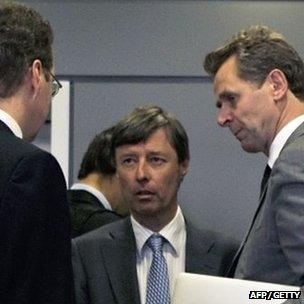Who are the troika that Greece depends on?
- Published

Greece is currently sweating it out to win the approval of the so-called "troika," who are assessing whether to release the next chunk of bailout cash to the nation.
This is money from the 110bn-euro ($148bn, £95bn) bailout agreed in 2010 by the European Union and the International Monetary Fund.
(Earlier this summer, eurozone leaders agreed a further 109bn-euro package, which is yet to be ratified and enacted.)
And Athens has admitted it will miss the deficit target for 2011 set by its patrons - which complicates further negotiations.
So who are the players that Greece is having to negotiate with?
European Union
The EU is represented in talks with Athens through its executive arm, the European Commission.
In May 2010, the EU and IMF agreed to bail out Greece. Of the 110bn euros designated, 80bn euros comes from the EU.
More specifically, it comes from the nations that use the euro - 16 countries at the time, before Estonia joined on 1 January 2011.
Countries such as the UK and Denmark are outside the eurozone and will not have to pay through the European mechanism for the bailouts of Greece, the Irish Republic and Portugal.
The European Commission, headed by President Jose Manuel Barroso, consists of 27 commissioners and is tasked with the day-to-day business of implementing EU policies and spending EU funds.
But the EU's executive body is subservient to the member states.
And as Europe's largest economy, and the one with the most cash to hand, Germany is perceived as having, in effect, the final say on these bailouts.
Ideas backed by the European Commission - such as common debt for all the euro nations, dubbed eurobonds - have floundered when entering the German domestic debate.
Germany's Finance Minister Wolfgang Schaeuble has poured cold water on the idea.
Germany, though the most powerful member of the eurozone, is one of 17 nations. If any country fails to ratify the decisions they take collectively, the plan dies.
As the biggest provider of bailouts, the EU collectively and individually has more authority in negotiations than it is given credit for.
International Monetary Fund
The IMF was created at the conference at Bretton Woods in 1944 as a means to regulate trade between nations in the aftermath of the Great Depression and World War II.
(The other pillar of the system is the World Bank.)
The institution has historically lent money in cases of deep economic trouble - Mexico in the 1980s, for example, Mexico again in 1995, south-east Asia and Russia in the late 1990s and Argentina in 2001.
The fund's role has expanded in the aftermath of the global financial crisis that struck in 2008. The IMF's members have agreed to increase the body's lending capacity, which has now been tripled to about $750bn.
The IMF has a complex system of voting rights, ensuring it remains dominated by the US and Europe. The US exerts a veto, for example.
It is currently undergoing a review of the voting structure, its biggest change since its founding. In practice, this means that emerging nations like China and Brazil are likely to get a bigger voice.
In the first Greek bailout, 30bn euros has come from the IMF.
Many of the goals for deficit targeting and restructuring the Greek economy have come from the IMF, which has experience with bailouts.
But with the minority of the money coming from them, they can only do so much.
IMF officials were most recently suggesting that the eurozone rescue fund should be boosted five-fold if Europe is to avoid defaults by any of its members.
European Central Bank
The final member of the troika is the central bank of the 17 nations that use the euro - perhaps the most reluctant member.
Until last year, the ECB was content to leave the European governments to solve the repercussions of the global financial crisis through political means.
In May 2010, the ECB started to buy Greek bonds in an effort to bring borrowing rates down and calm markets.
Since then, it has bought the bonds of all the countries whose yields have shot up on debt fears - Irish, Portuguese, Spanish and Italian debt.
This has annoyed German bankers, who have complained of indiscipline.
It also means that the ECB is now itself exposed to any eurozone default - indeed, the Germans have already agreed to recapitalise the ECB if there is a run on it.
Although the eurozone rescue fund was created in the second Greek bailout, investors feel that it is already too small to take care of further deterioration in the market.
IMF officials have been suggesting that the ECB is the only institution with the "firepower" to soothe markets.
They have suggested the aforementioned quintupling of the eurozone rescue fund should come from leveraging the fund via the ECB.
Taking in all the previous measures, the ECB has moved very far from its original mandate to target inflation - and many central bankers are not happy about that.
In September, Germany's Juergen Stark, the ECB chief economist, resigned amid speculation of conflicts within the bank over its bond-buying programme.
- Published27 November 2012
- Published27 October 2011
- Published23 September 2011
- Published2 October 2011